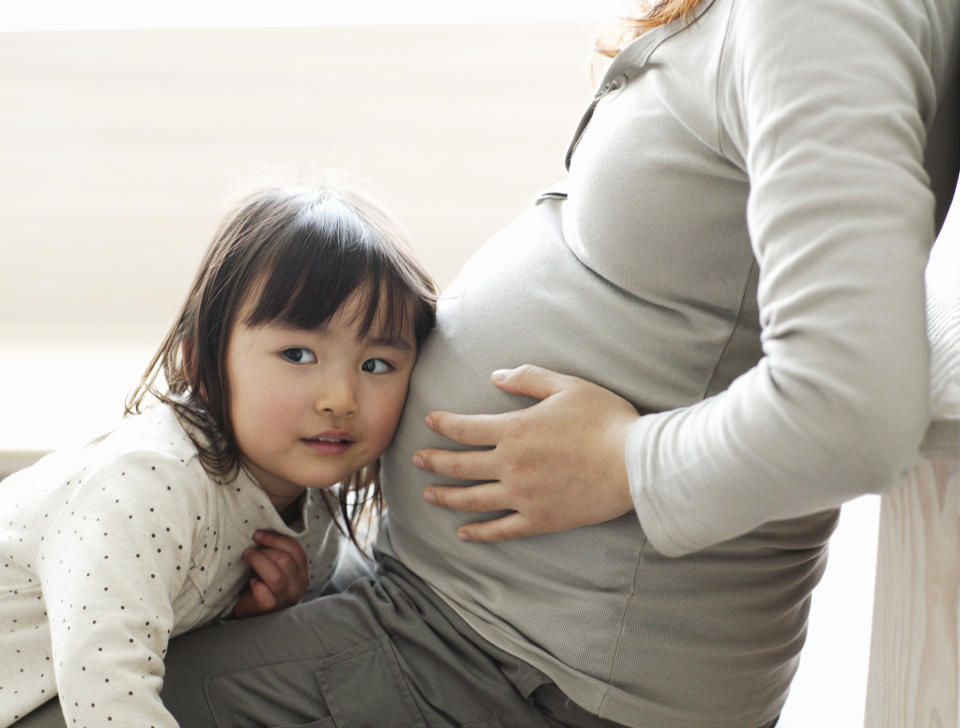How to explain the new surrogate baby to your other kids

Kim Kardashian, who is expecting her third child via surrogate, recently had a lavish baby shower, packed with cherry blossoms. But the Keeping Up with the Kardashians star said that she ultimately decided not to invite her surrogate because she thought it might be “weird.”
“I did introduce her to my family. I introduced her to my family earlier that day,” she told The Real. “I don’t know, it was a weird decision to have to make. Of course, I would’ve wanted her to be there and be a part of it, but I hadn’t really gone that far in explaining it to my kids yet. So I have to figure that out first before they really see, and then if we’re celebrating, you know, her — I just want to celebrate the baby. I think I have to explain it to my kids first and figure out how I’m going to explain it to them.”
Kardashian’s baby is reportedly due in January, so she’ll need to figure out how to explain the process to her kids pretty quickly. That said, it’s definitely easier for kids to understand that a new baby is on the way when they regularly see their mother’s expanding stomach.
Still, expecting a baby via surrogate or adoption isn’t all that different for children than expecting a new baby in the more typical way, licensed clinical psychologist John Mayer, PhD, author of Family Fit: Find Your Balance in Life, tells Yahoo Lifestyle. He says children should be kept in the loop from the beginning so they feel involved with the process. “The addition of a child by way of adoption, surrogacy, or foster care is a family decision,” he says. “The entire family, no matter what their ages, should be involved from the onset of the idea.”
Of course, you don’t necessarily need your 1-year-old’s approval before you start the surrogacy or adoption process, and it’s doubtful that they’ll even be able to fully comprehend the idea. But it is important to keep talking to them about the fact that a new member will be joining your family. “It should be natural, organic conversations,” Mayer says. “Don’t force the mention of the new baby. It will be a pervasive presence in the household, so let the discussion about the baby arise as a normal part of family life.”

It’s also a good idea to create an atmosphere where your children feel comfortable talking about the baby’s upcoming arrival, as well as bringing up any questions or concerns they may have, he says. That can be as simple as asking your child, “How do you feel about being a big sister?” or “What do you think it will be like once the baby arrives?”
It might seem like toddlers won’t be able to understand what’s coming, and they may not be able to fully grasp the magnitude of the whole situation. But they can understand the idea of a baby even at a year old, Mayra Mendez, PhD, LMFT, a licensed psychotherapist and program coordinator for mental health services at Providence Saint John’s Child and Family Development Center in Santa Monica, Calif., tells Yahoo Lifestyle. Tell your younger children that a new baby will be joining the family and engage them in play with dolls, in addition to reading stories about being a brother or sister, Mendez says. You can get into more details with older children, such as explaining that someone else is carrying the baby for Mommy and Daddy but it will soon be a part of the family just like them. “Older children over the age of 5 years are developmentally more prepared for verbal explanation,” Mendez says.
If you’re adopting, Mendez says it’s a good idea to avoid the idea that the new baby is coming into the family because she was unwanted by someone else. Also, refer to the birth mother as just that or the “tummy” mother and make it clear that you will be the baby’s family. “There is no good mother or bad mother in this situation, there is only an existential role differentiation,” Mendez says.
When you talk about the new baby coming, be sure to focus on what it will add to the family equation. “Your words should reflect that the new baby will integrate into the great family you have created already and not change the way things are,” Mayer says. “Don’t say, ‘Things will/have to be different when the new baby comes.’ This can frighten your present children.”
To get your children ready for the new arrival, Mayer recommends giving them a genuine, meaningful role in the preparations. That may mean having them help set up the nursery and select new clothes for the baby. Once the baby arrives, it’s important to involve them in helping to care for the baby, such as reading and singing to the baby so that they feel involved in the process.
Welcoming a new baby into your family is always an adjustment for everyone, but these little steps should help make the transition a little smoother.
Read more from Yahoo Lifestyle:
A women-only music festival is happening: Is keeping gender separate really a step forward?
Pregnant women are being advised to sleep on their side to cut the risk of stillbirth
Follow us on Instagram, Facebook, and Twitter for nonstop inspiration delivered fresh to your feed, every day.
